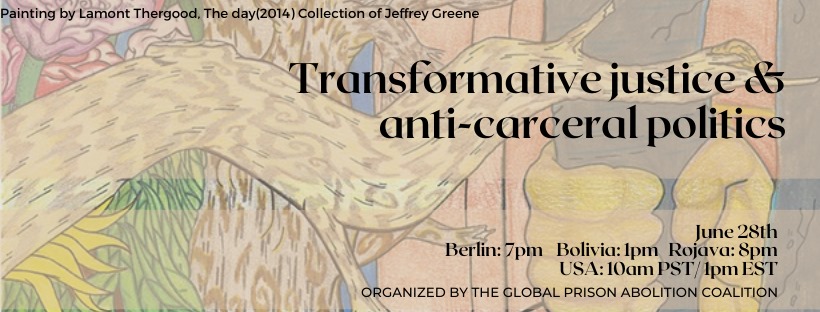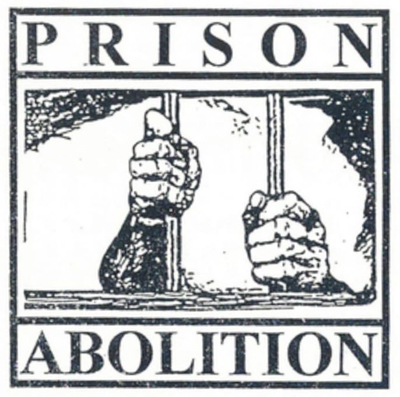The Global Prison Abolition Coalition invites you to a panel on Transformative Justice and anti-carceral politics.
The main driver behind the public’s rejection to abolitionist movements is the fear that there might be no alternative to prisons. This notion widely pushed by the state as well as other institutions that benefit from the carceral system is not true. There are alternative ways to think about justice beyond prisons and state punishment. This panel will address one such alternative: Transformative Justice (TJ).
Transformative Justice entails a political approach that seeks to build a anti-carceral politics while engaging in harm/violence reduction. This panel will unpack different understandings of abolitionism generated from an internationalist & anti-capitalist politics. The speakers will explore the history and significance of TJ in three locations, namely, Bolivia, Rojava in Northern Syria, and the United States.
https://www.facebook.com/events/914916035657763/
Speakers:
Joy James is the F.C. Oakley Professor in Humanities at Williams College, where she teaches in Political Science, Africana Studies, Women and Gender Studies, and American Studies. She is the author of Shadowboxing: Representations of Black Feminist Politics and Resisting State Violence: Radicalism, Gender and Race in U.S. Culture. Her edited books include The New Abolitionists: (Neo)Slave Narratives and Contemporary Prison Writings, Imprisoned Intellectuals, States of Confinement, The Black Feminist Reader, and The Angela Y. Davis Reader.
Nazan Üstündağ received her Ph.D. in 2005 from the sociology department at Indiana University Bloomington. Between 2005 and 2018, she worked as an Assistant Professor at Boğaziçi University, Department of Sociology. Since 2018, she resides in Berlin first as an Academy in Exile and IIE-Scholar Rescue Fund fellow and then as a Gerda Henkel Stiftung Patromonies Program fellow. Her most recent academic articles on state violence and Kurdish Movement appeared in journals South Atlantic Quarterly, History of the Present and Differences. She also worked as columnist in the journal Nokta and the newspaper Özgür Gündem. Üstündağ is a member of Women for Peace and Academics for Peace. Recently, she is finishing a book manuscript with the working title Mother, Politician and Guerilla: The Emergence of A New Political Cosmology in Kurdistan Through Women’s Bodies and Speech.
Raúl Zibechi is a Uruguayan journalist and one of Latin America’s leading political theorists. He is an international analyst for newspapers like La Jornada (Mexico) and Brecha (Uruguay), and a professor at the Multiversidad Franciscana de América Latina. Zibechi has written numerous books on social movements and politics across the Americas, including Territories in Resistance: A Cartography of Latin American Social Movements (AK Press, 2012) and Dispersing Power: Social Movements as Anti-State Forces (AK Press, 2010).
Moderator and Translator: The panel is moderated and translated by Linda Quiquivix who is a popular educator, geographer, and translator based in California. Linda Quiquivix (“Kiki”) is daughter of the undocumented migrant community in California and granddaughter of the Mam (Maya) people of Guatemala and Mexico. She places her university training as a geographer at the service of under-resourced communities in Palestine, Mexico, and the U.S. who seek clean water, land, and tools to build autonomy. In her hometown of Oxnard, California, she is part of a collective of seed savers and farmers who intervene against food insecurity, rebuild respectful ecological relationships to Mother Earth, and collectively organize toward climate resilience. She’s also a writer and researcher, currently working on a book manuscript entitled. Palestine and the Wretched of Empire: Race, Cartography, and the Afterlives of 1492, which traces the uses of cartography and international law in Palestine/Israel to show how movement leaders come to replicate domination when the world of empire becomes the starting point for politics.


